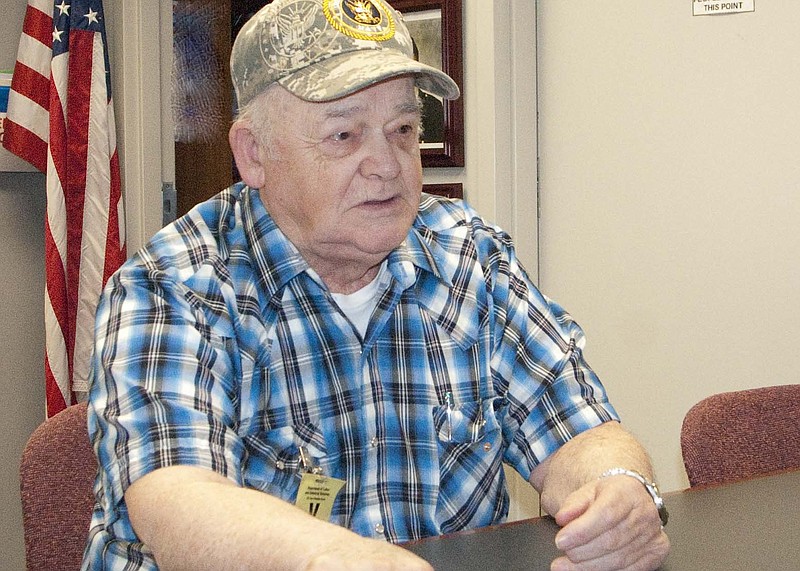Equipped with an unembellished recollection of events occurring several decades ago, local veteran Fred Landreth enjoys sharing the real world experiences and education he received while serving in the Navy.
A native of Horseshoe Lake, Ill., 79-year-old Landreth, of Eldon, left high school early in 1951 to pursue a career in the Navy.
As Landreth explained, an officer with the local naval recruiting station hunted ducks near his hometown, and helped influence the young man's desire to join the service.
In early 1952, the young recruit graduated from boot camp in San Diego and was assigned to an air transport squadron "across the creek" near North Island, Calif.
His duties with the air squadron would shift to sea duty when he volunteered for service aboard the USS Valley Forge, which had recently returned from service in Korea. His maiden voyage was short-lived, however, as the vessel left San Diego and traveled to Virginia where it went into dry-dock.
"I remember hanging from a net on the side of the ship and scraping paint all day," he laughed.
The ship received the necessary repairs and upgrades and Landreth participated in its shakedown cruise to Guantanamo Bay in 1954. Later the same year, he re-enlisted in the Navy and received the opportunity to attend airman school in Norman, Okla.
During the training, Landreth became familiar with several aspects of working with planes, including aircraft handling and responding to aviation fires.
The young sailor's career continued the specter of educational promotion when the encouragement of a senior non-commissioned officer provided the motivation for him to complete something he had previously abandoned.
"I hadn't finished high school," Landreth said. "While I was in the service, I had a chief put a "boot in my rear' and had me get my GED," he smiled.
He went on to complete additional training in aviation structural mechanics, and throughout the next several years served as a plane captain and crew chief in locations including California and Washington, overseeing the operation of naval aircraft assigned to his squadrons.
In 1962, with significant aviation experience to his credit, he was transferred to Millington, Tenn., serving as an instructor with the naval aviation school and teaching the basics of aircraft hydraulics, maintenance and repair.
Spending three years as an instructor, Landreth was reassigned to a coastal patrol squadron in San Diego in 1965, serving as a plane captain and crew chief for a P5M, a Martin seaplane used to check for submarine activity.
The squadron later switched aircraft to the P3 Orion, another type of maritime surveillance aircraft. Landreth then attended flight engineer training at Moffett Field, Calif., learning flight control operations.
Continuing to serve with air squadrons until 1968, the well-experienced sailor became an instructor for the Naval Air Mobile Training School at Moffett Field, training on flight control and hydraulic systems.
He remained an instructor with the school until Oct. 16, 1970, at which point he was able to retire early, having earned service credit for a re-enlistment program offered earlier in his career.
"I left the Navy at 9:00 a.m. and by noon (the same day) I was the assistant manager of a lumber yard in California," the veteran mused.
Now retired to the Mid-Missouri area, a location he was introduced to while vacationing during his time stationed in Tennessee, the married father of five believes his service has set an example that has carried forth to his own children.
"Two of my sons and my daughter served in the Navy," beamed the proud father.
But as the former sailor asserts, the most enduring reward gained from his two-decade investment in the nation's armed forces is the knowledge he gained both in and out of the classroom.
"I went in the Navy without a high school diploma and came out with a GED and some important life experiences," Landreth said.
"With all of the training I received throughout my career, it really showed the Navy's spotlight on making sure I had a good education and understood the importance of continuing to learn all aspects of my job."
Jeremy Amick is the public affairs officer for the Silver Star Families of America.

